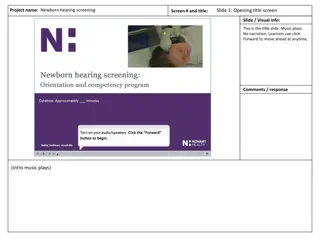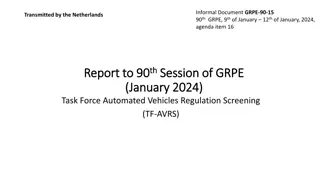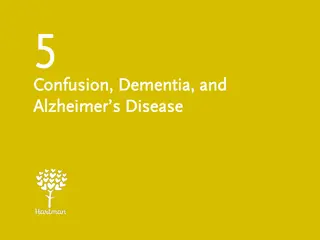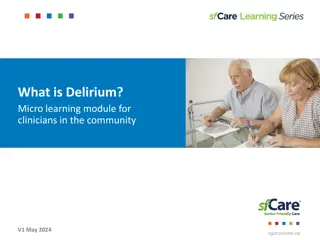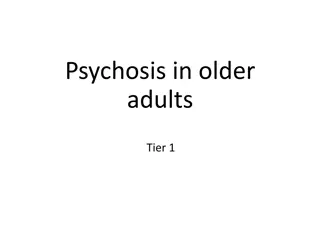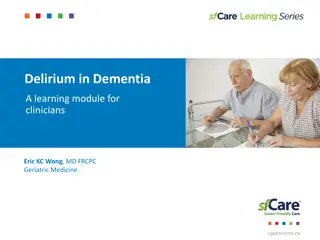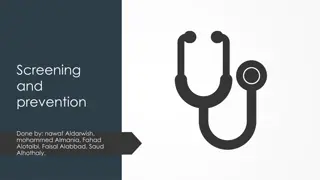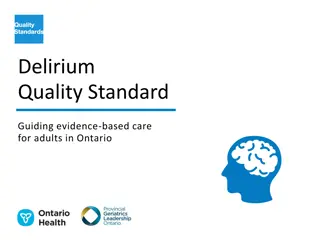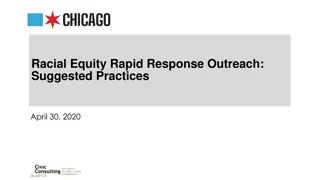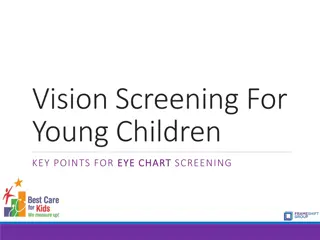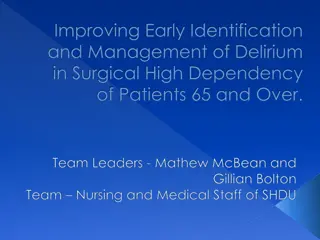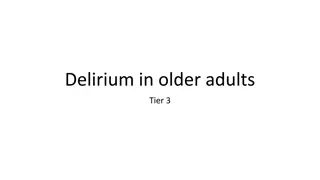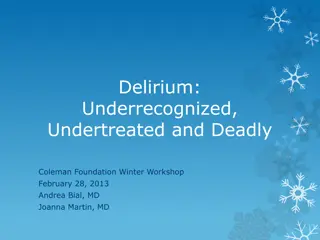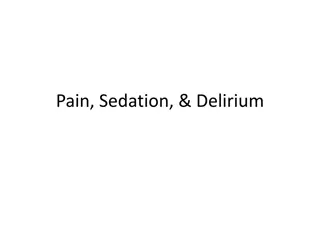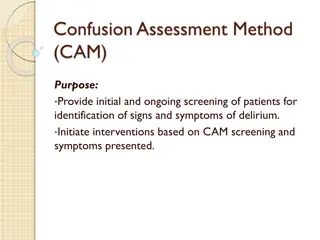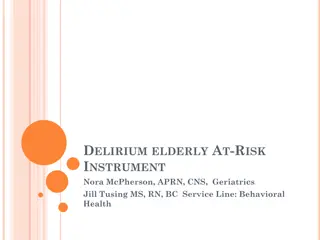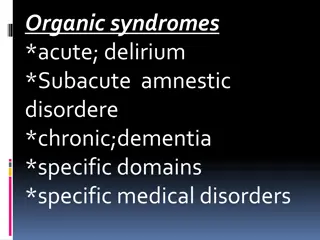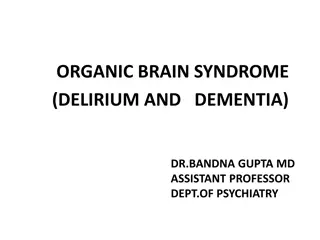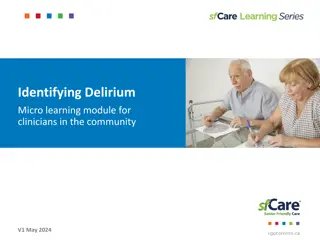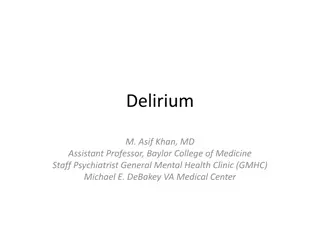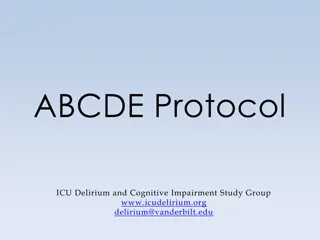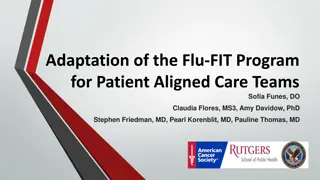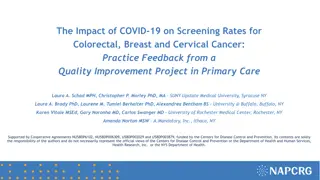Comprehensive ICU Protocol for Sedation, Analgesia, and Delirium Control by Dr. Vinod Srivastava
This comprehensive ICU protocol by Dr. Vinod Srivastava, an Associate Professor in Anaesthesiology & Critical Care at KGMU, covers key aspects such as sedation, analgesia, delirium assessment and control, stress ulcer and deep vein thrombosis prophylaxis, and glycaemic control in the ICU setting. Th
1 views • 50 slides
Understanding Newborn Screening in Oklahoma
Newborn screening in Oklahoma is crucial for detecting hidden disorders in newborns that may not be apparent at birth. Early detection through screening can lead to timely treatment, ensuring healthy development and potentially saving lives. The process involves testing every newborn for harmful con
1 views • 88 slides
Patient Screening and Workflow Process Optimization
The flowcharts and descriptions detail the steps involved in identifying eligible patients for screening, managing patient flow during visits, and tracking screening results. The process includes reviewing patient charts, determining screening eligibility, discussing screening options with patients,
2 views • 5 slides
Understanding Lung Cancer Screening Programs and Criteria
Screening for lung cancer is essential for early detection and intervention. CT scans have shown promise in reducing mortality rates, especially in high-risk populations. While challenges like cost and radiation risk exist, initiatives like the National Lung Screening Trial have demonstrated the eff
4 views • 28 slides
Screening for Malnutrition with MUST Tool
Understanding malnutrition is crucial for maintaining optimal health. Screening with the Malnutrition Universal Screening Tool (MUST) is essential to identify individuals at risk. This tool involves assessing BMI, calculating weight loss scores, and determining overall malnutrition risk. Proper scre
5 views • 25 slides
Ensuring Equality of Access to Cervical Screening: Key Considerations
Providing guidance on promoting equality of access to cervical screening, the importance of informed choice, information accompanying screening invitations, and checking for understanding to support individuals making informed decisions. Emphasizes the need for culturally sensitive approaches, espec
5 views • 21 slides
Overview of the NHS Cervical Screening Programme
The NHS Cervical Screening Programme aims to reduce the incidence and mortality of invasive cervical cancer by offering regular screening to eligible individuals. It covers the history, population screening programmes, and key milestones. Learn about the importance, coverage, and guidelines of the p
6 views • 19 slides
Newborn Hearing Screening Program Overview
The Newborn Hearing Screening Project aims to educate healthcare professionals on the importance of early identification of hearing loss in infants. The program discusses the significance of timely intervention, the impact of undetected hearing loss on child development, and provides guidelines for
0 views • 15 slides
Task Force Automated Vehicles Regulation Screening Report
The Task Force Automated Vehicles Regulation Screening (TF-AVRS) conducted multiple meetings and screenings to evaluate regulations and terms related to automated vehicles. The report outlines the screening process, considered items, results, and future plans for regulation screening in the automoti
0 views • 9 slides
Understanding Confusion, Dementia, and Delirium in Healthcare
This content discusses confusion, dementia, and delirium in relation to Alzheimer's disease, covering definitions, causes, and caregiving tips. Confusion is the inability to think logically, while delirium is a sudden state of severe confusion. Causes include infections, medications, and lack of sle
0 views • 53 slides
Understanding Delirium: A Micro Learning Module for Clinicians
Delirium is a sudden change in an individual's memory, thinking, and behavior, which requires urgent medical attention. Often misdiagnosed, it can be mistaken for other conditions like depression or dementia. Knowing the signs and symptoms, such as fluctuating confusion, difficulty focusing, and cha
1 views • 9 slides
Understanding Psychosis in Older Adults
Psychosis in older adults involves a loss of contact with reality, including hallucinations and delusions. Symptoms vary but can include disordered thoughts, behaviors, and negative symptoms. It is common in older adults and can have various causes, such as delirium, mood disorders, dementia, and su
0 views • 10 slides
Understanding Sanction Regime Framework and Screening Controls
The presented content illustrates the sanction regime framework and screening controls, highlighting the significance of sanctions, who should be screened, and what should be included in the screening process. It covers the scope of sanctions, the importance of sanction screening, tools used for scr
3 views • 42 slides
Understanding Delirium in Dementia for Clinicians
This learning module provides clinicians with insights into the relationship between delirium and dementia, how to distinguish between the two conditions, practical approaches to assessing delirium in dementia patients, treatment implications, and a structured method for delirium detection using cas
0 views • 29 slides
Comprehensive Guide to Screening and Prevention in Family Medicine
This comprehensive guide explores the definitions, uses, and levels of screening and prevention in family medicine. It covers the criteria for screening tests, types of screening, examples of targeted populations, and approaches to preventing common problems in primary care. The content discusses th
0 views • 73 slides
Prostate Cancer Screening Guidelines in Canada: A Snapshot of Strategies
The Canadian Partnership Against Cancer annually collects and summarizes data on national, provincial, and territorial prostate cancer screening guidelines and strategies. Despite the absence of organized screening programs, some provinces have policies in place, with opportunistic screening by prim
0 views • 13 slides
Delirium Quality Standard in Ontario: Improving Evidence-Based Care
Delirium quality standards in Ontario aim to guide evidence-based care for adults by addressing gaps and variations in care quality. These standards inform clinicians, patients, and organizations on what quality care looks like, incorporating the best available evidence to ensure consistent, high-qu
0 views • 39 slides
Best Practices for Racial Equity Rapid Response Outreach
This document outlines suggested practices for a racial equity rapid response outreach program, focusing on a workflow for patient outreach, prioritizing patients based on specific criteria, and components of screening including wellness checks and screening for chronic medical conditions. The workf
0 views • 6 slides
Importance of Vision Screening for Young Children
Understanding the critical development of vision in young children is crucial, as vision conditions can go undetected but have significant impacts. Early screening helps in identifying refractive errors, amblyopia, and strabismus for successful treatment. Prevalence statistics highlight the importan
0 views • 23 slides
Enhancing Delirium Management in Surgical High Dependency Patients 65 and Over
Improving early identification and management of delirium in surgical high dependency unit (SHDU) patients aged 65 and over led by Mathew McBean and Gillian Bolton. Data collection, education initiatives, and pharmacological management guidelines were implemented, resulting in increased staff confid
0 views • 5 slides
Understanding Delirium in Older Adults: Types, Causes, and Symptoms
Delirium in older adults is a complex syndrome characterized by disturbances in consciousness, attention, perception, thinking, memory, and behavior. It commonly presents as hyperactive, hypoactive, or mixed types and can be caused by various factors such as medication, infections, metabolic imbalan
0 views • 17 slides
Understanding Delirium and Dementia: Key Differences and Recognition
Delirium and dementia are distinct conditions with specific diagnostic criteria. Delirium involves acute changes in attention and cognition, often due to underlying medical issues. Differentiating delirium from dementia and mild cognitive impairment is crucial. Recognizing delirium's rapid onset, fl
0 views • 34 slides
Delirium: Underrecognized, Undertreated, and Deadly Workshop Insights
Delirium is a serious condition frequently seen in advanced illness and palliative care settings. It is often underrecognized and undertreated, leading to detrimental outcomes such as increased mortality and healthcare costs. Understanding the symptoms, prevalence, outcomes, and impact of delirium i
0 views • 54 slides
Pain, Sedation, & Delirium Management in Critical Care
Effective management of pain, sedation, and delirium is essential in critical care settings to optimize patient comfort, facilitate recovery, and ensure better outcomes. The goal is to control pain adequately, minimize sedative use, and address indications for analgesia and sedatives while being min
0 views • 23 slides
Comprehensive Overview of Confusion Assessment Method (CAM) for Delirium Screening
Confusion Assessment Method (CAM) is a crucial tool used for screening delirium in patients, particularly those aged 65 and older or presenting with acute confusion. CAM assesses for clinical features like acute onset, fluctuating course, inattention, disorganized thinking, and altered level of cons
0 views • 15 slides
Implementing Pulse Oximetry Screening for CCHD in Indiana
Indiana implemented pulse oximetry screening for Critical Congenital Heart Disease (CCHD) for all newborns as mandated by state law. The legislation, effective from January 1, 2012, requires every newborn in Indiana to receive CCHD screening, with exceptions only for religious beliefs. The state wor
0 views • 13 slides
Delirium Risk Assessment Tool for Elderly Patients
Assessing the risk of post-operative delirium in elderly patients is crucial for improving outcomes and reducing complications. The Delirium Elderly At-Risk (DEAR) instrument is a valuable tool that evaluates multiple domains including age, sensory impairment, functional dependence, substance use, a
0 views • 23 slides
Understanding Organic Syndromes: Delirium, Subacute Amnestic Disorder, and Chronic Dementia
Explore the spectrum of organic syndromes including delirium, subacute amnestic disorder, and chronic dementia. Delve into the definitions, statistics, causes, management strategies, classifications, and reversible dementias associated with these conditions.
0 views • 13 slides
Understanding Cognitive Disorders in Psychiatry: A Comprehensive Overview
Cognitive disorders disrupt higher brain functions, impacting memory, attention, and decision-making abilities. This article explores the classification of cognitive disorders, focusing on delirium, a common syndrome characterized by consciousness disturbance and cognitive changes. Delirium predomin
0 views • 26 slides
Understanding Organic Brain Syndrome & Delirium
Overview of organic brain syndrome and delirium, including definitions, clinical features, and management. Delirium, a common psychiatric syndrome, affects consciousness, cognition, and perception, leading to increased morbidity and mortality. Recognize core symptoms, such as disturbances in conscio
0 views • 37 slides
Enhancing Cervical Cancer Screening through NHS Cytology Programme
The NHS Cytology Screening Programme aims to reduce incidence and mortality from cervical cancer by offering systematic, efficient screening for pre-malignant diseases. With a history dating back to 1988, the programme targets women aged 25-64, emphasizing the importance of visualizing the cervix an
1 views • 38 slides
Locality-Led Adoption Post Pilot of the Greater Manchester Delirium Toolkit
Highlighting the successful pilot of the Greater Manchester Community Delirium Toolkit led by local teams in various regions. The toolkit aimed to standardize screening, assessment, and management of delirium, resulting in improved quality of care, proactive follow-up, timely treatment, education fo
0 views • 17 slides
Screening and Prevention in Family Practice
Definition of screening and prevention in family practice along with the Wilson-Jungner criteria, types of screening tests, and examples like colonoscopy and breast cancer screening. Objectives include understanding screening types and targeted populations, pros and cons of screening, and appropriat
0 views • 33 slides
Understanding Delirium: Differentiating It from Dementia in Community Clinics
Learn how to differentiate delirium from dementia in community clinic settings with this micro-learning module. Delirium is often misdiagnosed but has key features such as sudden changes in cognition, fluctuating symptoms, and altered alertness levels. Discover practical assessment approaches and ca
0 views • 7 slides
Understanding Delirium: Diagnosis, Management, and Implications
Delirium, a common yet often misdiagnosed condition, is a disturbance of consciousness with acute onset and fluctuating symptoms. Learn about its impact, diagnostic criteria, and management strategies in clinical settings to improve patient outcomes.
0 views • 37 slides
Understanding Disease Screening and Prevention in Medicine
Explore the concepts of disease screening and prevention in preventive medicine. Learn about the importance of recognizing preclinical cases, the iceberg phenomenon of disease, and the role of medical intervention in arresting disease progression. Discover when to apply screening, the types of scree
0 views • 36 slides
Overview of Cervical Cancer Screening Programs in Canada
The Canadian Partnership Against Cancer conducts an annual environmental scan on cervical cancer screening guidelines and strategies across the country. Organized screening programs are available in most provinces, offering services to asymptomatic women at average risk. This scan provides insights
1 views • 46 slides
ABCDE Protocol and MIND-USA: Enhancing Critical Care Practices
Explore the importance of the ABCDE Protocol in managing ICU patients, focusing on sedation, analgesia, and the prevention of delirium. Learn about the potential drawbacks of sedative therapies and the need for coordinated care in critical care settings. Discover the MIND-USA ABCDE Protocol, emphasi
0 views • 43 slides
Implementation of Flu-FIT Program for Patient Aligned Care Teams at East Orange VA
This study details the adaptation of the Flu-FIT Program to enhance colorectal cancer screening rates within patient aligned care teams at the Veterans Affairs (VA) Department. By linking influenza immunization with colorectal cancer screening using fecal immunochemical testing, the project aimed to
0 views • 10 slides
Impact of COVID-19 on Cancer Screening Rates in Primary Care
This study examines the impact of the COVID-19 pandemic on colorectal, breast, and cervical cancer screening rates in safety-net primary care practices. A 7-year Quality Improvement Project aimed to increase screening rates through tailored education and practice facilitation. The project faced chal
0 views • 5 slides







